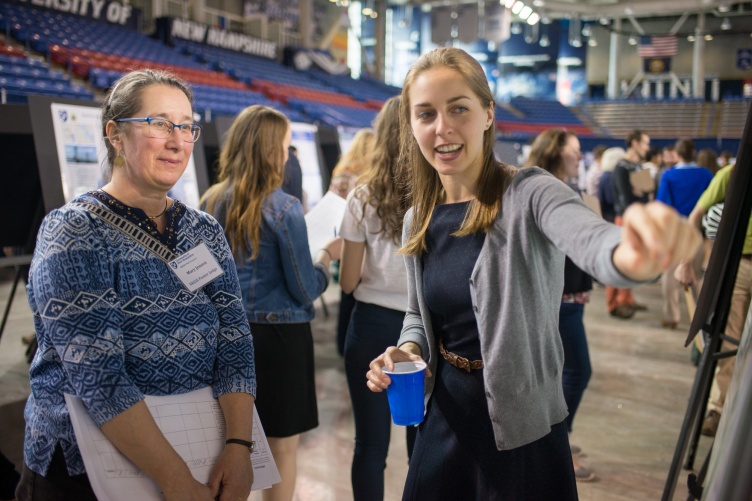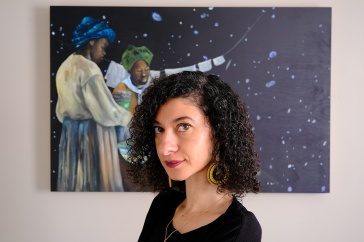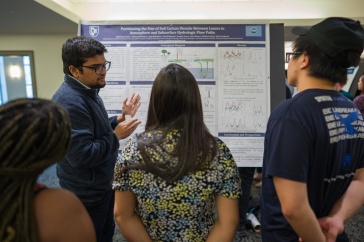
This is what the GRC looked like in past years. For the second year running, it was held virtually.
For the second year running, the annual Graduate Research Conference (GRC) was held virtually, with some exciting updates.
The web platform has expanded to reflect the variety of research and scholarship that is showcased during Graduate Student Appreciation Week, which occurred this year April 19-23. While the website includes the traditional oral and poster presentations that have been hallmarks for the GRC, it now also contains a 3-Minute Thesis section with videos from the 2021 competition.
“Collectively, these efforts represent countless hours of lab and field research of [graduate] students, who also overcame the challenges of working during a pandemic—and that is a tall order, indeed,” says university president Jim Dean in his welcome video. “And the results are remarkable—these presentations address some of the biggest questions in science and society and offer innovative solutions to real world problems.”
The GRC saw a total of 100 participants spanning across Durham, Manchester, and online campuses. As of last week, the web platform reached over 5,000 hits.
For event organizers Jovana Milosavljevic-Ardeljan and Caroline Kanaskie, the increased participation across campuses presents a significant cause to continue holding the GRC online, in addition to the original in-person poster and oral sessions.
“We will definitely be keeping the online platform,” says Milosavljevic-Ardeljan. “We love to see students beyond Durham participate—especially online students. Plus, all participants can widely share their presentations with family, friends, on social media, as well as link them on a CV or website.”
“The website has allowed us to essentially build an archive of graduate research,” Kanaskie adds. “So much amazing scholarship happens at UNH, and we want to be able to access all of that in one place.”
For Medini Weerasighe, a doctoral student in biology who had a top-viewed oral presentation, the online platform challenged her to minimize scientific jargon, as she would not be available to answer questions on the spot like at an in-person conference. She then shared her presentation far and wide.
“I spread the word about my work to a lot of people. I told my friends both here and back in my country, Sri Lanka,” she said. “I think social media also helped to ask other people to watch my work. […] I took the full benefit of being able to present my work on an online platform!”
As is tradition, two graduate student participants received a Leitzel Center Award, which recognizes exemplary STEM education and outreach presented at the GRC. The oral presentation winner was Jordan Bader, a PhD student in biology, and the poster presentation winner was Michael Routhier, a PhD student in natural resources.
In addition to graduate students, this year’s GRC also featured trainees from New Hampshire-Maine Leadership Education in Neurodevelopmental Disabilities Program (NH-ME LEND).
“LEND trainees complete Capstone Projects in disability-related field placements across NH and Maine and the GRC provides an important forum for sharing this important work,” said Betsy Humphreys, director of NH-ME LEND. “The event is also attended by many of our community partners in the disability community and is a nice way to thank them for their participation.”
The GRC was made possible by donors who gave to the Graduate School during the 603 challenge. In addition to event organizers Milosavljevic-Ardeljan and Kanaskie, the event’s success is owed to Michael Routhier, Information Technologist Manager in the UNH Earth Systems Science Center, who created the online platform and helped manage it throughout the event.
You can view all GRC presentations in this media gallery, as well as those highlighted in this story below.
Leitzel Center Awardees
- “Testing Geospatial Technology Learning Tools in the Classroom for Inspiring the Learning of Environmental Science” by Michael Routhier (PhD NRESS) and Catherine Overson, Michael Handwork, Shani Scarponi, Gregg Moore, and Barrett Rock
- “The Decision is in the Details: Justifying decisions about socioscientific issues” by Jordan Bader (PhD Biology) and Melissa Aikens, Kelsey Ahearn, Beverly Allen, Diya Anand, and Andrew Coppens
Top Viewed Presentations
- “Physiological and biochemical effects of three different types of nitrogen fertilizer applied as foliar spray on hybrid poplar clone NM6 (Populus nigra L. x P. maximowiczii A. Henry)” by Medini Weerasighe (PhD Biology) and Subhash C. Minocha, Rakesh Minocha, Stephanie Long, Maegan A. Gagne, and Sanchari Kundu
- “Evaluating Healthcare Personnel During a Pandemic Using the Burnout and Occupational Well-Being Survey (BOWS)” by Bryan Patriquin (Masters in Public Health)
- “Computer science education in New Hampshire” by Purnya Awasthi (MS Computer Science)
- “Quality of Experience of DASH video streaming with QUIC over HTTP3” by Sindhu Chellappa (MS Computer Science)
-
Written By:
Lily Greenberg '21G | Grad School



















































